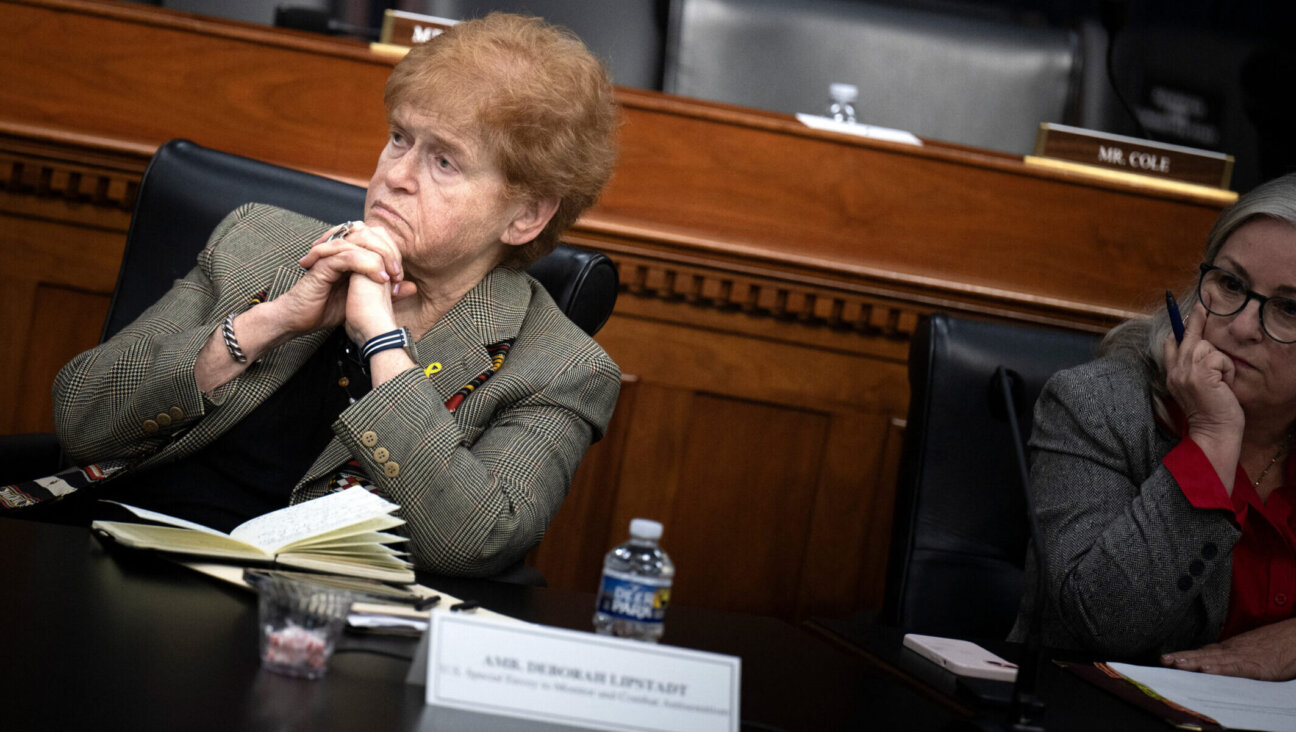Screaming Silence
No discussion of Annapolis can be complete without considering the roles of the minor players inside and outside the assembly hall. These are the folks commonly spoken of as the supporting cast. A better term this time might be unsupporting cast.
One of the most important roles was reserved for the foreign ministers of Arab states, from Saudi Arabia and Syria to little Qatar, who made appearances at the Naval Academy. The Arab states have twice gone on record, through resolutions of the Arab League, with a formal offer to normalize relations with Israel — embassies, trade, tourism, the works — if and when Israel reaches a satisfactory agreement with the Palestinians. So far it’s all words; they’re offering a payoff only after Israel has paid the full price and assumed all the risks of the Palestinian treaty.
Many Israelis understandably wonder if the Arab League offer is worth anything. Coming to Annapolis was a way for the Arab leaders to start showing good faith. Breaking bread with the Israelis and politely applauding Olmert’s speech were an essential down payment on the Arab League proposal.
The Arab ministers play the Sadat part in this drama, putting their bodies on the line. Alas, they haven’t played the part very well so far; they came to Maryland kicking and screaming, and undermined their cause. They, more than anyone, will have to work a lot harder in the future if this deal is going to work. They can no longer pretend to be bystanders.
When the story is told, though, no one will have more explaining to do than the organized American Jewish community. For 40 years, the major Jewish organizations have taken on as their most important task the defense of Israel in the American public square. They’ve placed a taboo on questioning Israel’s actions publicly, and those who do raise questions have been taken to task, publicly humiliated, hounded from jobs and community positions. Israel, we’ve been told over and over, has the right to decide its own security needs. Roadblocks throughout the West Bank? Not our business. Inadequate safeguards for enemy civilians? We can’t judge, but Israel knows what it’s doing.
Now, when Israel decides to take a dramatic step toward the peace of which it has dreamed for decades, there’s a screaming silence. Major organizations on the right actively lobby Congress to tie Israel’s hands — understandably, perhaps, given their theology — but face no censure from the central community bodies that never hesitated to censure the left. As for those in the center, they’re not sure how they feel.
Does it matter? Very much. Nationwide, congregants are wondering what to make of the topsy-turvy turn of events; they’d always been told that Arabs can’t be trusted and the Palestine Liberation Organization are murderers. Explanations are offered, if at all, only from properly hawkish (and anti-government) Israeli sources. The left has sympathetic literature, but gets no help distributing it.
Last week, at the last minute, a handful of major centrist organizations quietly issued statements expressing hope that Israel is right. But there was no serious campaign to get the word out. The Jewish community knows how to organize when it wants to; consider the continuing outcry from pulpits and newspapers for the freedom of three soldiers captured last year. The same could be done for a nation held hostage to war and terror for 60 years and now planning a daring escape. Why not?
The Forward is free to read, but it isn’t free to produce

I hope you appreciated this article. Before you go, I’d like to ask you to please support the Forward.
Now more than ever, American Jews need independent news they can trust, with reporting driven by truth, not ideology. We serve you, not any ideological agenda.
At a time when other newsrooms are closing or cutting back, the Forward has removed its paywall and invested additional resources to report on the ground from Israel and around the U.S. on the impact of the war, rising antisemitism and polarized discourse.
This is a great time to support independent Jewish journalism you rely on. Make a gift today!
— Rachel Fishman Feddersen, Publisher and CEO
Support our mission to tell the Jewish story fully and fairly.
Most Popular
- 1

Opinion The dangerous Nazi legend behind Trump’s ruthless grab for power
- 2

Opinion A Holocaust perpetrator was just celebrated on US soil. I think I know why no one objected.
- 3

Culture Did this Jewish literary titan have the right idea about Harry Potter and J.K. Rowling after all?
- 4

Opinion I first met Netanyahu in 1988. Here’s how he became the most destructive leader in Israel’s history.
In Case You Missed It
-

Opinion Gaza and Trump have left the Jewish community at war with itself — and me with a bad case of alienation
-

Fast Forward Trump administration restores student visas, but impact on pro-Palestinian protesters is unclear
-

Fast Forward Deborah Lipstadt says Trump’s campus antisemitism crackdown has ‘gone way too far’
-

Fast Forward 5 Jewish senators accuse Trump of using antisemitism as ‘guise’ to attack universities
-
Shop the Forward Store
100% of profits support our journalism
Republish This Story
Please read before republishing
We’re happy to make this story available to republish for free, unless it originated with JTA, Haaretz or another publication (as indicated on the article) and as long as you follow our guidelines.
You must comply with the following:
- Credit the Forward
- Retain our pixel
- Preserve our canonical link in Google search
- Add a noindex tag in Google search
See our full guidelines for more information, and this guide for detail about canonical URLs.
To republish, copy the HTML by clicking on the yellow button to the right; it includes our tracking pixel, all paragraph styles and hyperlinks, the author byline and credit to the Forward. It does not include images; to avoid copyright violations, you must add them manually, following our guidelines. Please email us at [email protected], subject line “republish,” with any questions or to let us know what stories you’re picking up.













